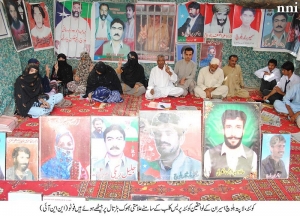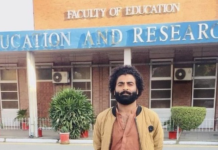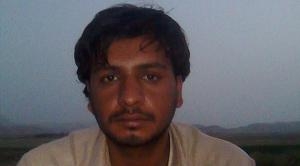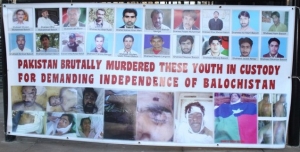QUETTA, 17 November 2011 (IRIN) – A slightly faded black-and-white photograph of a young man hangs above the mantelpiece in Zarina Bibi’s tiny house in the town of Khuzdar in southwestern Balochistan province. Bibi, in her 70s, occasionally places a vase of flowers near the photograph. It is one of the few she possesses of her grandson, Abdul Rehman, who “vanished” some nine months ago. “I don’t know if I will ever see him again,” she told IRIN. Like her other relatives, Bibi, who had raised Rehman since he was four years old, when his father died, believes he was taken away by the security forces. In a July 2011 report, the New York-based Human Rights Watch (HRW) blamed state security agencies operating in Balochistan for dozens of disappearances, as part of a battle being fought against nationalist forces struggling for greater autonomy. The report states: “While the problem is widespread, the exact number of enforced disappearances perpetrated in recent years by Pakistan’s security forces remains unknown. “Anti-government Baloch nationalists claim thousands of cases. Official numbers of disappeared persons are wildly contradictory. In 2008, Pakistan’s Interior Minister, Rehman Malik, admitted at least 1,100 victims. In January 2011, Balochistan’s Home Minister, Mir Zafrullah Zehri, told provincial legislators that only 55 persons were considered missing.” HRW also said 70 bodies of previously missing persons had turned up in various places in Balochistan between July 2010 and February 2011. Bodies meanwhile continue to turn up, according to media reports, some with clearly visible torture marks. Torture “My brother was taken away from near Quetta a year ago. His body was found in Turbat, a town lying south of the province, a few months later. Looking at the marks on his body it is horrible to contemplate what his last days must have been like,” the relative of an 18-year-old victim told IRIN. He wished to remain anonymous as the family had been warned not to speak out or risk “further consequences”. “No real efforts have been made to recover these persons,” Nasrullah Baloch, chairman of the Voice of Baloch Missing Persons, an organization that works for the rights of people missing in Balochistan, told IRIN. He said “most victims are poor and are affiliated with political or nationalist groups”. The group says about 14,000 people are missing while 230 bodies have been recovered from various parts of Balochistan since June 2010. The issue of missing persons has also been taken up by the Supreme Court of Pakistan since May 2010. In October this year it directed the government to pay compensation to victims’ families. Lists provided to the court of the number of people missing in Balochistan vary while those given by the office of the Chief Minister of Balochistan include more than 700 names. On more than one occasion, the Chief Minister has expressed “grave concern” over missing people in the province, and said “all-out efforts” were being made to recover them. However, the people of the province remain acutely disturbed by the disappearance of relatives, and have regularly staged protest rallies to draw attention to their situation. “My younger brother’s friend is among the disappeared,” said Zakia Rehman, 28, a mother of two. “I worry about him all the time, since he, like many other students at his college, supports the nationalist cause. My elderly parents live in constant fear. We have heard so many tales of terrible torture inflicted even on teenagers – and I wonder what the future for my own sons will be as they grow up in this environment,” she told IRIN. No real efforts have been made to recover these persons… most victims are poor and are affiliated with political or nationalist groupsThe Prime Minister, the Interior Minister and senior army officers, who deny security forces are involved in the killing of missing persons, have all condemned disappearances in Balochistan. Scepticism But despite this, the unrest continues to increase. Recent terrorist violence, such as a blast that claimed 14 lives in the town of Tando Allahyar, in the Jaffarabad district of Balochistan, on 14 August, Pakistan’s independence day, was carried out by Baloch nationalist groups angered by the disappearances and other abuses. Organizations such as the autonomous Human Rights Commission of Pakistan have also expressed extreme alarm over the situation, and in a June 2011 report, which followed a fact-finding mission to the province, demanded “Baloch people’s overriding concerns about missing persons should be addressed”, while urging the need “to set up a high-level commission with powers to investigate cases of disappearance, examine witnesses and summon any state functionary who has had anything to do with these matters”. But scepticism abounds. “This will never happen here,” said Shehzad Baloch, a member of the nationalist Baloch Republican Army. “No one will help us, so we must take matters into our own hands.” Balochistan, the country’s largest province in terms of territory, has a long history of insurgency going back to the 1950s, soon after Pakistan was created in 1947. It is also, according to official figures, the least developed of the four provinces. kh/mwTheme (s): Conflict, Governance, Human Rights, Security,[This report does not necessarily reflect the views of the United Nations]http://www.irinnews.org/report.aspx?reportid=94221






